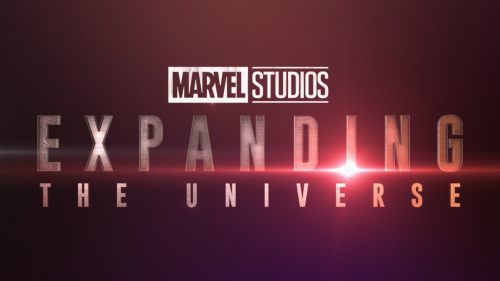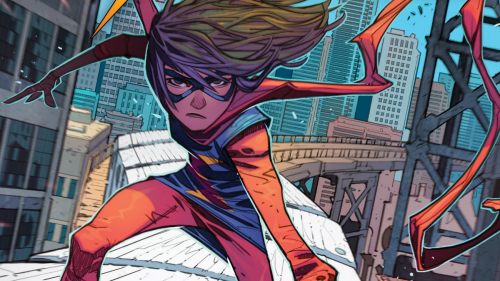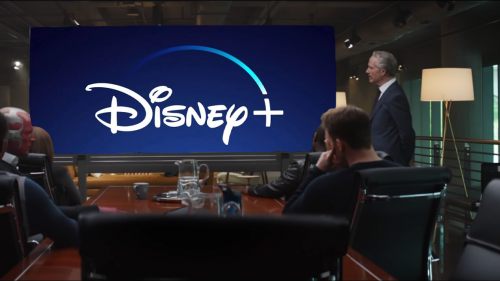Inside The New Marvel Bullpen
In the 1960s Marvel Comics promoted itself as the House of Ideas, and one part of that identity came from the “Marvel Bullpen” - editors, production types, artists and writers would work in a big, open plan space that allowed them to throw around ideas and concepts, get advice on their work and generally create an atmosphere that facilitated creativity. Your boss has probably recently rearranged your office to be closer to what Stan Lee and company were doing back in 1963.
Over time that “Bullpen” went away - freelancers work at home from across the country, the small office space Marvel originally occupied ballooned into a real, enormous office space - but its place in the foundational mythos of Marvel Comics never diminished.
Surprisingly, something of a “Marvel Bullpen” has begun sprouting up in the Burbank offices of Marvel Studios. While the popular idea of Marvel Studios has been that it’s an assembly line cranking out movies made to order according to a producer’s vision (see the travails of Edgar Wright and Alan Taylor as examples), something very different seems to be happening these days as the studio enters Phase Three. As Ike Perlmutter’s shadow no longer darkens Marvel Studios' doors and as the cryptic Creative Committee has seen its power lessened, something more collegial has popped up in its place.
“One of the nice aspects of working at Marvel is the interaction with the other directors and writers,” says Peyton Reed, who is currently developing Ant-Man and the Wasp. “ In Hollywood, directors don't always hang out with each other. We're generally too self-absorbed, egotistical and focused on our own things. So it's cool to see Taika {Waititi} or Scott {Derrickson} in the hallway and talk about whatever. It's fun to have a meal with James {Gunn} and discuss what we're doing. It's awesome to have Ryan Coogler in the office next to mine. It taps into that Marvel Bullpen fantasy for me.”
Captain America: Civil War is, in many ways, the culmination of all of Marvel’s movies to date, and that means as the films bump into each other more and more that Bullpen atmosphere becomes more important.
“We are constantly interacting with everyone because we’re doing these movies that inherit so much of what they have done, or that may affect what they’re going to do,” says Civil War co-director Anthony Russo. “Interfacing becomes more and more important, especially as Marvel starts to do more movies per year. The soup is getting thick.”
For me that’s where it gets interesting: how do the individual filmmakers make sure they get to do what they want to do while also being able to service the larger arc of the Marvel Cinematic Universe, which is heading to The Movies Formerly Known As Infinity War? In many ways it’s exactly what the continuity-heavy Marvel comics were always doing, but no one has ever truly tried this on a cinematic scale as grand as this. And in Phase Three it’s only getting grander, as crossovers have become the norm as opposed to the exception: Iron Man will show up in Spider-Man: Homecoming, Hulk is the co-lead in Thor: Ragnarok, Ant-Man debuts new powers in Civil War.
“The filmmakers are very focused - and very protective - of their own projects, but at the same time they know it’s the sand box,” says Marvel Studios president Kevin Feige. “And they know it’s fun. Peyton Reed was showing Joe and Anthony Russo early cuts of Ant-Man and giving them an idea how to include him in Civil War. There’s always been a very nice back and forth. There’s just enough friendliness and enough rivalry.”
The rivalry comes into play when filmmakers are trying to stake out their own corner of the universe. While James Gunn gets to have his Guardians of the Galaxy safely light years away from the main thrust of the MCU, the other filmmakers don’t have that luxury - in many ways Marvel Studios is post-auteur. But while Peyton Reed may have lost the opportunity to reveal Giant Man in his own movie, he will get to debut The Wasp. It's the compromises that come when playing in the bigger sandbox.
“Wasp had been in some early versions of Civil War, and I had some discussions with Evangeline Lilly about that,” Feige revealed. “But the more we thought about it, the more we realized that would do a disservice to that character and to what we wanted to tell in Ant-Man and The Wasp.”
Besides the changes at the top of Marvel Studios in the wake of restructuring, the other big change in Phase Three is the loss of Joss Whedon. Whedon had been signed on as “Creative Consultant” for Marvel in Phase Two, but now he’s moved on. It’s not clear to me how that worked out internally, but Kevin Feige says that position won’t happen again.
“With Joss it was an official thing,” Feige says. “It was a contractual thing, which was the ability to enlist him to do some writing and oversee what was happening. That was the only time we’ve ever done something like that. But people share scripts with each other and get thoughts, we do that all the time.”
While there’s no official “Creative Consultant,” the fact that the Russo Brothers are directing the big deal Avengers 3 and 4 means they have become the de facto driving forces of the MCU - all the movies have to feed into what they’re doing.
“As populists, Anthony and I have always been interested in a United Artists concept,” Joe Russo says. “One of the things that’s happening at Marvel right now is that we are very close friends with James Gunn, we’re very close friends with Peyton Reed, we’re very close with Scott Derrickson and Jon Watts. There’s a community of us as filmmakers who are working together very collaboratively and who enjoy handing each other curveballs with the characters so that we can pick up the thread and move it forward. Part of the fun of the job is picking up the threads left by these other filmmakers.”
Reed agrees. “It's necessary and it's also, creatively speaking, really fun. Again, our movies are all connected but they also have to stand on their own. Things they do affect us and things we do affect them, but it's flexible. Obviously, where Scott Lang ends up in Civil War affects how we start him out in Ant-Man and the Wasp, but there are no limits to where we take him in our movie. There are definitely situations and events that everyone in the MCU is building towards.”
Like Thanos and his pursuit of the Infinity Stones. “With Infinity War as these culmination movies, there’s certainly going to be a lot of interaction between us and the other caretakers of the characters,” says Joe Russo. “We love that, and it might be the best part of the job.”



